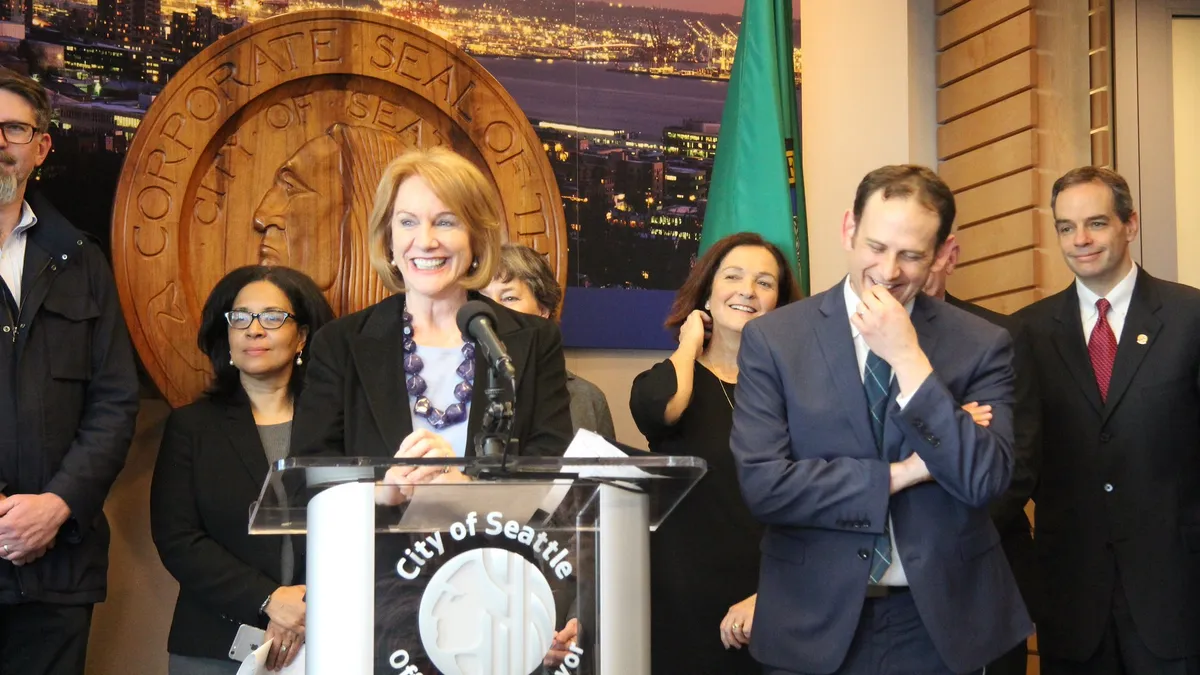With challenges around affordable housing, climate change, congestion and mobility, there is plenty to keep Seattle Mayor Jenny Durkan occupied.
Sea levels are projected to rise 10 inches by 2050 as warmer temperatures melt snowpacks, and the smoke from nearby forest fires has at times made the city's air quality worse than Beijing. Meanwhile, Seattle has a lack of affordable housing stock and a significant homeless population, and as ridership grows on public transit, the city must also wrestle with traffic congestion.
Seattle has rolled out initiatives in all those areas and more this year, though Durkan acknowledged that the work is far from completed. "You can never do enough in any one year," she told Smart Cities Dive in an interview.
In tackling climate change, Durkan has pushed several policies designed to drive down emissions, with the Seattle City Council passing a law she championed requiring all new buildings with off-street parking to have electric vehicle (EV) charging infrastructure. And she proposed a tax on heating oil providers to help transition homes from oil heaters to electric heat.
Durkan has also helped to ease the difficulties that stem from the smokey air of nearby forest fires. The city's smoke initiative informed people of the health risks of breathing in bad air, and created designated centers for people to go to for respite.
"Part of it is prevention and part of it is mitigation," Durkan said of the city's strategy to fight the effects of climate change.
But the city remains bedeviled by a lack of affordable housing, an issue exacerbated by population growth that has seen it add 130,000 residents in a short space of time, and many of those newcomers are high-paid tech workers.
To curb those growing pains, Durkan released her "Housing Seattle Now" initiative earlier this year that addresses the housing needs of low- and middle-income residents. That initiative has included investing $50 million in permanent supportive housing for people experiencing long-term homelessness, and investing more than $78.2 million in new housing and anti-displacement measures as part of the 2020 budget.
Durkan has also pushed new housing developments on surplus city-owned property with permission from the state government, and has encouraged transit-oriented development. Around 70% of Seattle residents live in walking distance from a transit station, and Durkan said it is imperative to keep adding affordable housing near transit stops.
She looks to encourage more equitable transit use through programs like ORCA Opportunity, which provides transit cards to public high-school students and is being piloted for low-income tenants in public housing. Enrolled students save over $255 in bus fare during the school year.
That commitment to equity has extended to Durkan’s proposal for a minimum wage and other protections for ride-hailing drivers, including a first-in-the-nation Driver Resolution Center. Known as "Fare Share" legislation, it includes a 51-cent-per-ride fare increase for riders, which would allow city officials to invest in housing near transit, streetcar service and the Driver Resolution Center.
By the numbers
In five years, Seattle’s 51-cent-per-ride fee is projected to generate:
Durkan said the legislation arrives as more people drive for Uber and Lyft, and also as more people work in the gig economy, requiring greater labor protections and livable wages. She said she hopes to have it approved by the city council next year.
"If you look at the changing economy right now, more and more people aren't in employee jobs, they're gig workers," Durkan said. "If we don't have some kind of minimum wage guarantees for those gig workers, then we don't have a minimum wage."
The plan already has a strong level of community support, in spite of opposition from the ride-hailing companies. The Fare Share Seattle coalition came together within weeks as a partnership of organizations representing areas including labor, housing, transit, the environment and social justice, and said that the minimum wage proposal coupled with the 51-cent tax showed a commitment to boosting equity in the city.
"There's no denying that our tech-fueled boom has brought enormous change to Seattle," Nicole Grant, executive secretary-treasurer of MLK Labor, a coalition member, said in a statement. "The Fare Share plan is about capturing some of that growth and using it to invest in ways that benefit us all."
It all centers on Durkan's plan to work on a "whole range of systemic things," with plenty of opportunities to make the city "smarter and better."












